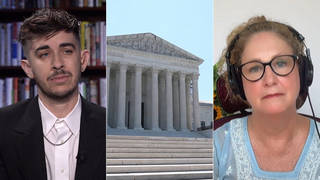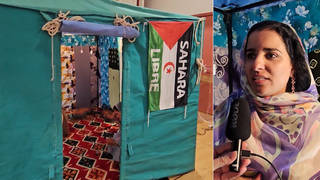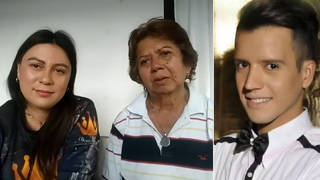
Guests
- Angela Davisauthor, activist and professor at the University of California, Santa Cruz.
Legendary scholar and activist Angela Davis’s work around issues of gender, race, class and prisons has influenced critical thought and social movements across several generations. Amy Goodman sat down with her in Washington, D.C., in October to discuss freedom struggles over the past 50 years, and where people’s movements are going next.
More from this Interview
Transcript
AMY GOODMAN: This is Democracy Now!, democracynow.org, The War and Peace Report. I’m Amy Goodman, as we return to my conversation with former Black Panther Angela Davis, professor emerita at the University of California, Santa Cruz. I spoke with her in October in Washington, D.C., at the cultural hub and restaurant Busboys and Poets.
AMY GOODMAN: You go back 50 years. You look at 1968. And you look at today. How does it compare, from the protests at San Francisco State and Columbia University, the protests in Paris, in France, the level of organizing—of course, that year, the assassination of both Dr. King and Robert Kennedy—but the level of organizing that took place then and what’s happening right now? Does this give you hope?
ANGELA DAVIS: Absolutely. Absolutely. And I think what gives me hope is the extent to which young organizers have been able to build on the work of those who came before them. And I am so impressed by young organizers and Dream Defenders, Black Lives Matter, Black Youth Project 100, SURJ.
You know, white people are really beginning to change significantly. I mean, I’m remembering that—you know, it used to be that we assumed racism was just about attitude. Right? And so the only way you can deal with a racist is to say, “Oh, you should go to an unlearning racism workshop.” You remember—I mean, this is what people who made these public—these racist statements publicly were then asked to atone and to learn. And there was no sense of the extent to which racism is so deeply embedded in the structures and the institutions of this society. And I think now there is a popular understanding of the fact that you can’t just assume that by finding Jason Van Dyke guilty of the murder of Laquan McDonald that that’s going to change the situation. The Chicago Police Department will continue to be as racist as it was before. And so this notion of abolition has really, really taken hold.
And, you know, I don’t envy young activists and organizers, because they have to deal with so much more. Things were so much simpler for us. And that’s because we had no idea how complicated these issues really are. I often point out the fact that when we began—when we were calling for black freedom, that was always freedom for the black man, you know? And women were doing most of the organizing, and the women who were doing the organizing didn’t even realize that we were excluding ourselves, through our very vocabulary, from the terrain of freedom. And that’s no longer the case. The role of gender and sexuality, I think, you know, queer approaches are becoming more mainstream in terms of organizing queer feminist approaches. And that’s exciting. Yeah.
So, even though I know the world always appears to be so chaotic, and sometimes we can’t see a way out, but I think the work that we have to do is to guarantee that we pass down a legacy to the next group, the next generation. And that’s our only hope for achieving change. And I see the work that young activists are doing today and the way in which they’re also—because you are not young that long. You know, many people are under the impression that youth is an eternal. It doesn’t happen that way. Before you know it, you will have aged out of youth. And so—so it’s so important to train others to share. And with each generation, it becomes richer and more interesting and more complicated. I am sometimes amazed listening to young activists who speak so fluently about the ways in which homophobia, transphobia not only affect those who identify as trans or as LGBTQ, but it’s about the entire world. The challenging of the gender binary has allowed us to recognize that everything can be challenged. If you can challenge what was considered to be the most basic guarantor of normalcy—right?—then you can challenge anything. You can challenge capitalism. You know? You can see your way to a future beyond the kind of obscene capitalist framework that has formed and shaped our lives. So I’m excited. Things look a lot—those of you who are young may not feel this, but things look a lot more hopeful to me. It’s the young people who represent the future. And so they are the ones who have to take the leadership. They are the ones who have to lead us into the next phase.
And I guess as I get older, I realize how important it is for us to imagine ourselves as something more than our own individual lives, that we’re connected with people who came before us, and we will be connected to people who come after us. So it’s our responsibility to do the work that will—and the responsibility of younger people, too, to make sure that you do the work that will keep the ideas alive, that will keep the possibility of freedom alive. Because it’s not going to happen tomorrow. We know that. But it can happen. It can happen sometime in the future. Well, I don’t think we will ever actually reach that point that we can call freedom, because what’s exciting is that on the road we notice that things are so much more complicated. You know? And so, I’m excited about what you will discover in the future. No one could have predicted 20 years ago that trans movements would be so important to social justice today. No one could have predicted that.
And so, I see us expanding the terrain of freedom. And I’m imagining that in the future we will have movements to protect animals, that will become much more widespread. We’ll have a different relation. We’ll experience our relationship to those with whom we share the planet in very different ways. And then there are all of those freedom ideas that I can’t even imagine. But I know that in the future they will emerge. And so, I’m excited. It’s actually—you know, it’s not that bad to be old. It isn’t, as long as you maintain that kind of perspective and vision that allows you to feel connected to both those who are younger and those who are older, those who came before us and those who will come after us many generations into the future.
AMY GOODMAN: The legendary activist and scholar Dr. Angela Davis, professor emerita at the University of California, Santa Cruz. I spoke with her in October in Washington, D.C., at Busboys and Poets. To see a transcript or the video or audio podcast of the interview, go to democracynow.org.












Media Options